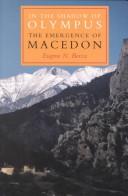| Listing 1 - 6 of 6 |
Sort by
|
Book
Year: 1708 Publisher: [Oxoniae, : E. Theatro Sheldoniano,
Abstract | Keywords | Export | Availability | Bookmark
 Loading...
Loading...Choose an application
- Reference Manager
- EndNote
- RefWorks (Direct export to RefWorks)
eebo-0018
Book
Year: 1665 Publisher: London : Printed for William Miller ...,
Abstract | Keywords | Export | Availability | Bookmark
 Loading...
Loading...Choose an application
- Reference Manager
- EndNote
- RefWorks (Direct export to RefWorks)
eebo-0113

ISBN: 2802711296 9602327936 9782802711292 Year: 1998 Publisher: Athènes : Bruxelles : Sakkoulas ; Bruylant,
Abstract | Keywords | Export | Availability | Bookmark
 Loading...
Loading...Choose an application
- Reference Manager
- EndNote
- RefWorks (Direct export to RefWorks)
Book
ISBN: 9788855131001 Year: 2023 Publisher: Milano : LED, Edizioni universitarie di lettere economia diritto,
Abstract | Keywords | Export | Availability | Bookmark
 Loading...
Loading...Choose an application
- Reference Manager
- EndNote
- RefWorks (Direct export to RefWorks)
La prima metà del IV secolo a.C. è un’età di transizione in Grecia. Non si può comprendere al meglio questa stagione senza concentrarsi su un protagonista, Epaminonda (fine V sec. – 362 a.C.), che sconfisse Sparta sul campo e portò al successo importanti innovazioni tattiche. Epaminonda affascina ancora come modello di guida eclettica che seppe rispondere con moderazione ed equilibrio alle sfide di uno scenario internazionale profondamente mutato. Centrale per Epaminonda fu il Peloponneso. Nella complessità della sua carriera politica risiede il fascino maggiore di questo instancabile uomo delle istituzioni. Epaminonda fu un generale anomalo da più di un punto di vista, dotato di una profonda cultura musicale e di una sensibilità alla filosofia che ribalta anche i pregiudizi contro la sua patria, tacciata spesso come città chiusa all’approfondimento delle scienze. Non sorprende perciò l’attenzione di Epaminonda al peso della propaganda nella rappresentazione degli interventi nel Peloponneso, sempre giustificati come difesa dell’autonomia. L’Epaminonda statista provò a interpretare il policentrismo del suo tempo e a offrire delle risposte, il cui esito non fece in tempo a vedere.
Epaminondas, --- Thebes (Greece) --- Sparta (Greece) --- Spárti (Greece) --- Spartē (Greece) --- Sparta --- Thēvai (Greece) --- Thívai (Greece) --- Thebes (Greece : Ancient city) --- Thiva (Greece) --- Thēva (Greece) --- Tebe (Greece) --- Theben (Greece) --- Thebes (Greece : Extinct city) --- Θῆβαι (Greece) --- Thēbai (Greece) --- Θήβα (Greece) --- History. --- History, Military. --- Epaminondas

ISBN: 0691055491 0691215944 9780691055497 Year: 1990 Publisher: Princeton : Princeton University Press,
Abstract | Keywords | Export | Availability | Bookmark
 Loading...
Loading...Choose an application
- Reference Manager
- EndNote
- RefWorks (Direct export to RefWorks)
In tracing the emergence of the Macedonian kingdom from its origins as a Balkan backwater to a major European and Asian power, Eugene Borza offers to specialists and lay readers alike a revealing account of a relatively unexplored segment of ancient history. He draws from recent archaeological discoveries and an enhanced understanding of historical geography to form a narrative that provides a material-culture setting for political events. Examining the dynamics of Macedonian relations with the Greek city-states, he suggests that the Macedonians, although they gradually incorporated aspects of Greek culture into their own society, maintained a distinct ethnicity as a Balkan people. "Borza has taken the trouble to know Macedonia: the land, its prehistory, its position in the Balkans, and its turbulent modern history. All contribute ... to our understanding of the emergence of Macedon ... Borza has employed two of the historian's most valuable tools, autopsy and common sense, to produce a well-balanced introduction to the state that altered the course of Greek and Near Eastern history.
Macedonia --- -Macedon --- History --- -Macedonia --- -History --- Makedhonia --- Makedonia --- Makedoniya --- Makedonja --- Macedon --- -Oudheid. --- Macedoniërs. --- Makedonien (Altertum) --- Europe --- Council of Europe countries --- Eastern Hemisphere --- Eurasia --- Oudheid. --- Aegae. --- Aeschines. --- Alexander I. --- Archelaus. --- Axios R. --- Boeotia. --- Brasidas. --- Caranus. --- Cassander. --- Cersebleptes. --- Diodorus Siculus. --- Epaminondas. --- Eumenes of Cardia. --- Florina. --- Gygaea. --- Hellenistic period. --- Heracles. --- Hesiod. --- Isocrates. --- Kotys (Cotys). --- Lefkadia. --- Makedones. --- Mardonius. --- Naousa. --- Olympia. --- Peloponnesian War. --- Persians. --- Salonica. --- Sitalces. --- Themistocles. --- Thermaic Gulf. --- Thrace. --- Vergina. --- Via Egnatia. --- World War II. --- Xerxes. --- Zeus. --- gold resources. --- inscriptions. --- minerals and mines. --- painting. --- -Makedonien (Altertum) --- Macedoine --- Histoire ancienne
Book
ISBN: 0691223599 Year: 2021 Publisher: Princeton, New Jersey : Princeton University Press,
Abstract | Keywords | Export | Availability | Bookmark
 Loading...
Loading...Choose an application
- Reference Manager
- EndNote
- RefWorks (Direct export to RefWorks)
"What we can learn about fostering innovation and creative thinking in any field from some of the most inventive people of all times-the ancient Greeks. When it comes to innovation and creative thinking, we are still catching up with the ancient Greeks. Between 800 and 300 BCE, they changed the world with astonishing inventions-democracy, the alphabet, philosophy, logic, rhetoric, mathematical proof, rational medicine, coins, architectural canons, drama, lifelike sculpture, and competitive athletics. None of this happened by accident. Recognizing the power of the new and trying to understand and promote the conditions that make it possible, the Greeks were the first to write about innovation and even the first to record a word for forging something new. In short, the Greeks "invented" innovation itself-and they still have a great deal to teach us about it. How to Innovate is an engaging and entertaining introduction to key ideas about-and examples of-innovation and creativite thinking from ancient Greece. Armand D'Angour provides lively new translations of selections from Aristotle, Diodorus, and Athenaeus, with the original Greek text on facing pages. These writings illuminate and illustrate timeless principles of creating something new-borrowing or adapting existing ideas or things, cross-fertilizing disparate elements, or criticizing and disrupting current conditions. From the true story of Archimedes's famous "Eureka!" moment, to Aristotle's thoughts on physical change and political innovation, to accounts of how disruption and competition drove invention in Greek warfare and the visual arts, How to Innovate is filled with valuable insights about how change happens-and how to bring it about"--
Technological innovations. --- SELF-HELP / Creativity. --- PHILOSOPHY / History & Surveys / Ancient & Classical. --- Technological innovations --- Greece. --- Breakthroughs, Technological --- Innovations, Industrial --- Innovations, Technological --- Technical innovations --- Technological breakthroughs --- Technological change --- Creative ability in technology --- Inventions --- Domestication of technology --- Innovation relay centers --- Research, Industrial --- Technology transfer --- al-Yūnān --- Ancient Greece --- Ellada --- Ellas --- Ellēnikē Dēmokratia --- Elliniki Dimokratia --- Grčija --- Grèce --- Grecia --- Gret︠s︡ii︠a︡ --- Griechenland --- Hellada --- Hellas --- Hellenic Republic --- Hellēnikē Dēmokratia --- Kingdom of Greece --- République hellénique --- Royaume de Grèce --- Vasileion tēs Hellados --- Xila --- Yaṿan --- Yūnān --- Ελληνική Δημοκρατία --- Ελλάς --- Ελλάδα --- Греция --- اليونان --- يونان --- 希腊 --- Anaximander. --- Anaximenes. --- Aristotle. --- Artillery. --- Ballista. --- Battle of Leuctra. --- Battlement. --- Buddhism. --- Buddhist texts. --- Buoyancy. --- Capture of Grenada (1779). --- Cavalry. --- Clothing. --- Common ownership. --- Communal land. --- Consideration. --- Constitution. --- Creativity. --- Criticism. --- Cultivator. --- De rerum natura. --- Democracy. --- Democritus. --- Diodorus Siculus. --- Disadvantage. --- Dividend. --- Dough. --- Drinking. --- Empedocles. --- Epaminondas. --- Ephesus. --- Ephor. --- Epicurus. --- Eureka effect. --- Finance. --- First principle. --- Ford Model T. --- Fortification. --- Governing (magazine). --- Government. --- Greek alphabet. --- Greek mythology. --- Hippodamus of Miletus. --- Household. --- Ingenuity. --- Institution. --- Investor. --- Leather. --- Legislation. --- Leuctra. --- Long hair. --- Lucretius. --- Main course. --- Manchu language. --- Mast (sailing). --- Mathematical proof. --- Meal. --- Modern physics. --- Natural philosophy. --- Ningxia. --- North Africa. --- Of Education. --- Oligarchy. --- Ownership. --- Panchen Lama. --- Parmenides (dialogue). --- Pasture. --- Phenomenon. --- Philosopher. --- Philosophy. --- Phrase. --- Physics (Aristotle). --- Pleasure. --- Politics. --- Principle. --- Projectile. --- Prow. --- Qianlong Emperor. --- Quantity. --- Renaissance. --- Rhetoric. --- Ruler. --- Self-control. --- Sharing. --- Siege engine. --- Syracusia. --- Tariff. --- Thales. --- The First Man. --- The Interpretation of Dreams. --- Thebes, Greece. --- Theory. --- Thought. --- Travel. --- Vitruvius. --- Water tank. --- Wealth. --- Weapon. --- Writing. --- Zeuxis.
| Listing 1 - 6 of 6 |
Sort by
|

 Search
Search Feedback
Feedback About UniCat
About UniCat  Help
Help News
News